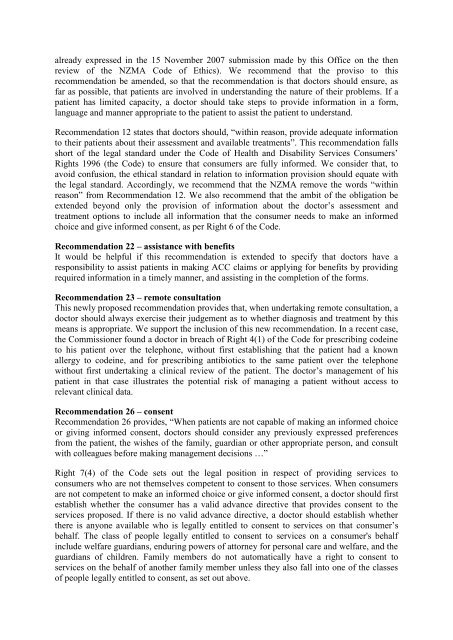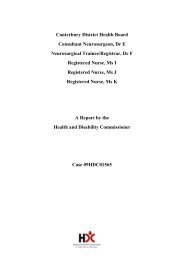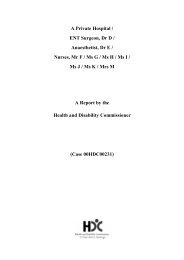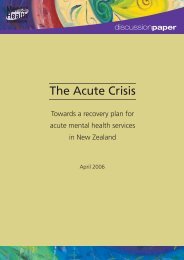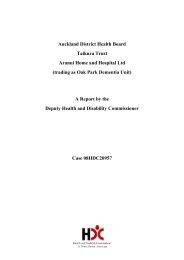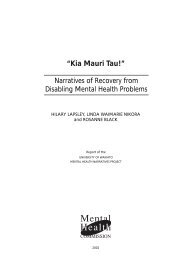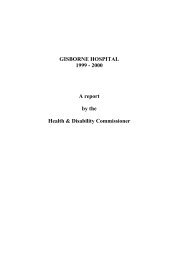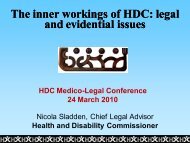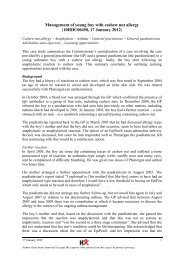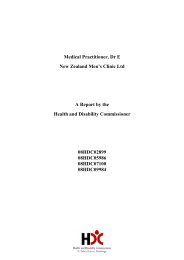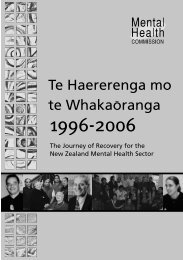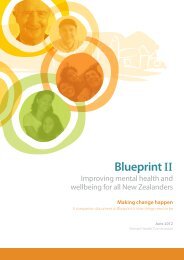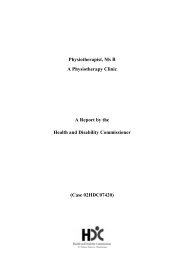Code of Ethics for the New Zealand Medical Profession - Health and ...
Code of Ethics for the New Zealand Medical Profession - Health and ...
Code of Ethics for the New Zealand Medical Profession - Health and ...
Create successful ePaper yourself
Turn your PDF publications into a flip-book with our unique Google optimized e-Paper software.
already expressed in <strong>the</strong> 15 November 2007 submission made by this Office on <strong>the</strong> <strong>the</strong>n<br />
review <strong>of</strong> <strong>the</strong> NZMA <strong>Code</strong> <strong>of</strong> <strong>Ethics</strong>). We recommend that <strong>the</strong> proviso to this<br />
recommendation be amended, so that <strong>the</strong> recommendation is that doctors should ensure, as<br />
far as possible, that patients are involved in underst<strong>and</strong>ing <strong>the</strong> nature <strong>of</strong> <strong>the</strong>ir problems. If a<br />
patient has limited capacity, a doctor should take steps to provide in<strong>for</strong>mation in a <strong>for</strong>m,<br />
language <strong>and</strong> manner appropriate to <strong>the</strong> patient to assist <strong>the</strong> patient to underst<strong>and</strong>.<br />
Recommendation 12 states that doctors should, “within reason, provide adequate in<strong>for</strong>mation<br />
to <strong>the</strong>ir patients about <strong>the</strong>ir assessment <strong>and</strong> available treatments”. This recommendation falls<br />
short <strong>of</strong> <strong>the</strong> legal st<strong>and</strong>ard under <strong>the</strong> <strong>Code</strong> <strong>of</strong> <strong>Health</strong> <strong>and</strong> Disability Services Consumers’<br />
Rights 1996 (<strong>the</strong> <strong>Code</strong>) to ensure that consumers are fully in<strong>for</strong>med. We consider that, to<br />
avoid confusion, <strong>the</strong> ethical st<strong>and</strong>ard in relation to in<strong>for</strong>mation provision should equate with<br />
<strong>the</strong> legal st<strong>and</strong>ard. Accordingly, we recommend that <strong>the</strong> NZMA remove <strong>the</strong> words “within<br />
reason” from Recommendation 12. We also recommend that <strong>the</strong> ambit <strong>of</strong> <strong>the</strong> obligation be<br />
extended beyond only <strong>the</strong> provision <strong>of</strong> in<strong>for</strong>mation about <strong>the</strong> doctor’s assessment <strong>and</strong><br />
treatment options to include all in<strong>for</strong>mation that <strong>the</strong> consumer needs to make an in<strong>for</strong>med<br />
choice <strong>and</strong> give in<strong>for</strong>med consent, as per Right 6 <strong>of</strong> <strong>the</strong> <strong>Code</strong>.<br />
Recommendation 22 – assistance with benefits<br />
It would be helpful if this recommendation is extended to specify that doctors have a<br />
responsibility to assist patients in making ACC claims or applying <strong>for</strong> benefits by providing<br />
required in<strong>for</strong>mation in a timely manner, <strong>and</strong> assisting in <strong>the</strong> completion <strong>of</strong> <strong>the</strong> <strong>for</strong>ms.<br />
Recommendation 23 – remote consultation<br />
This newly proposed recommendation provides that, when undertaking remote consultation, a<br />
doctor should always exercise <strong>the</strong>ir judgement as to whe<strong>the</strong>r diagnosis <strong>and</strong> treatment by this<br />
means is appropriate. We support <strong>the</strong> inclusion <strong>of</strong> this new recommendation. In a recent case,<br />
<strong>the</strong> Commissioner found a doctor in breach <strong>of</strong> Right 4(1) <strong>of</strong> <strong>the</strong> <strong>Code</strong> <strong>for</strong> prescribing codeine<br />
to his patient over <strong>the</strong> telephone, without first establishing that <strong>the</strong> patient had a known<br />
allergy to codeine, <strong>and</strong> <strong>for</strong> prescribing antibiotics to <strong>the</strong> same patient over <strong>the</strong> telephone<br />
without first undertaking a clinical review <strong>of</strong> <strong>the</strong> patient. The doctor’s management <strong>of</strong> his<br />
patient in that case illustrates <strong>the</strong> potential risk <strong>of</strong> managing a patient without access to<br />
relevant clinical data.<br />
Recommendation 26 – consent<br />
Recommendation 26 provides, “When patients are not capable <strong>of</strong> making an in<strong>for</strong>med choice<br />
or giving in<strong>for</strong>med consent, doctors should consider any previously expressed preferences<br />
from <strong>the</strong> patient, <strong>the</strong> wishes <strong>of</strong> <strong>the</strong> family, guardian or o<strong>the</strong>r appropriate person, <strong>and</strong> consult<br />
with colleagues be<strong>for</strong>e making management decisions …”<br />
Right 7(4) <strong>of</strong> <strong>the</strong> <strong>Code</strong> sets out <strong>the</strong> legal position in respect <strong>of</strong> providing services to<br />
consumers who are not <strong>the</strong>mselves competent to consent to those services. When consumers<br />
are not competent to make an in<strong>for</strong>med choice or give in<strong>for</strong>med consent, a doctor should first<br />
establish whe<strong>the</strong>r <strong>the</strong> consumer has a valid advance directive that provides consent to <strong>the</strong><br />
services proposed. If <strong>the</strong>re is no valid advance directive, a doctor should establish whe<strong>the</strong>r<br />
<strong>the</strong>re is anyone available who is legally entitled to consent to services on that consumer’s<br />
behalf. The class <strong>of</strong> people legally entitled to consent to services on a consumer's behalf<br />
include welfare guardians, enduring powers <strong>of</strong> attorney <strong>for</strong> personal care <strong>and</strong> welfare, <strong>and</strong> <strong>the</strong><br />
guardians <strong>of</strong> children. Family members do not automatically have a right to consent to<br />
services on <strong>the</strong> behalf <strong>of</strong> ano<strong>the</strong>r family member unless <strong>the</strong>y also fall into one <strong>of</strong> <strong>the</strong> classes<br />
<strong>of</strong> people legally entitled to consent, as set out above.


